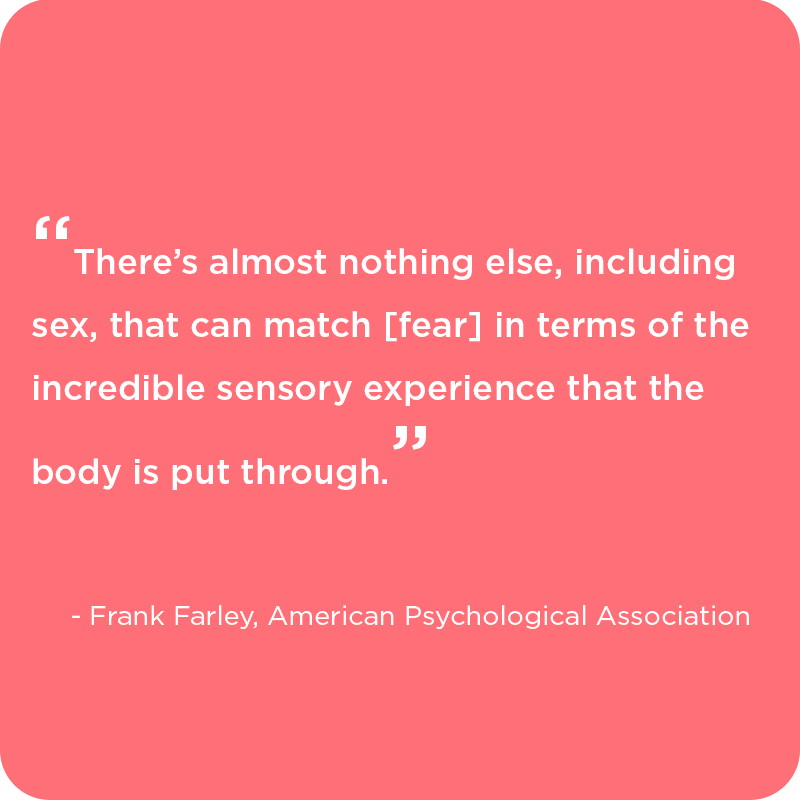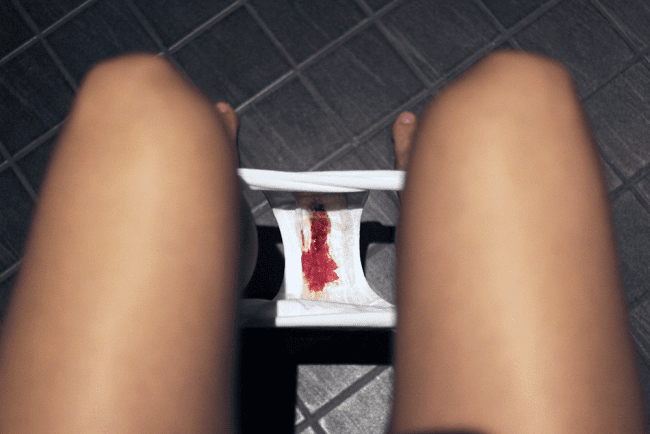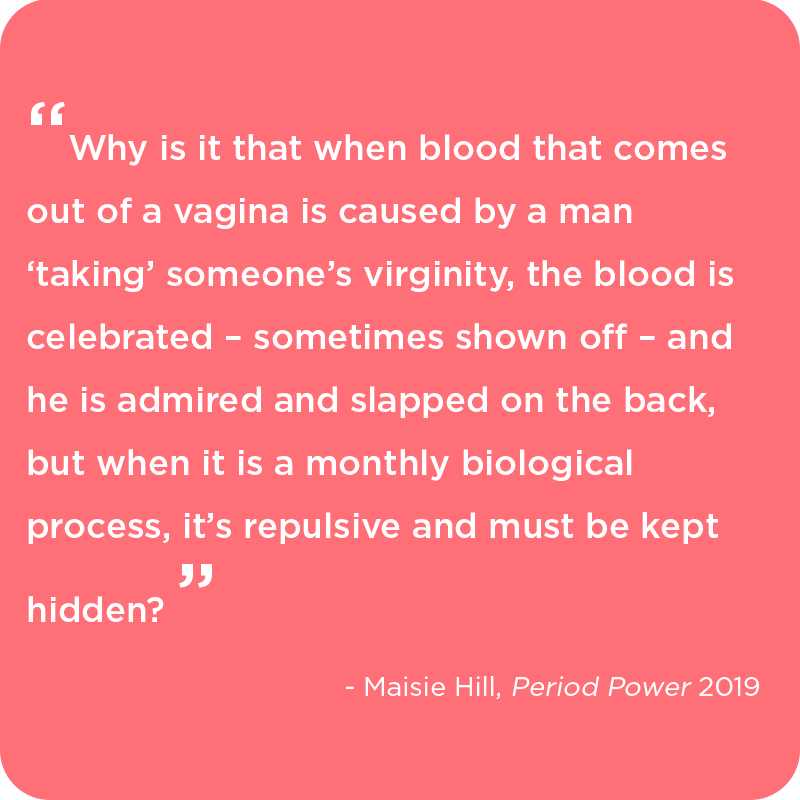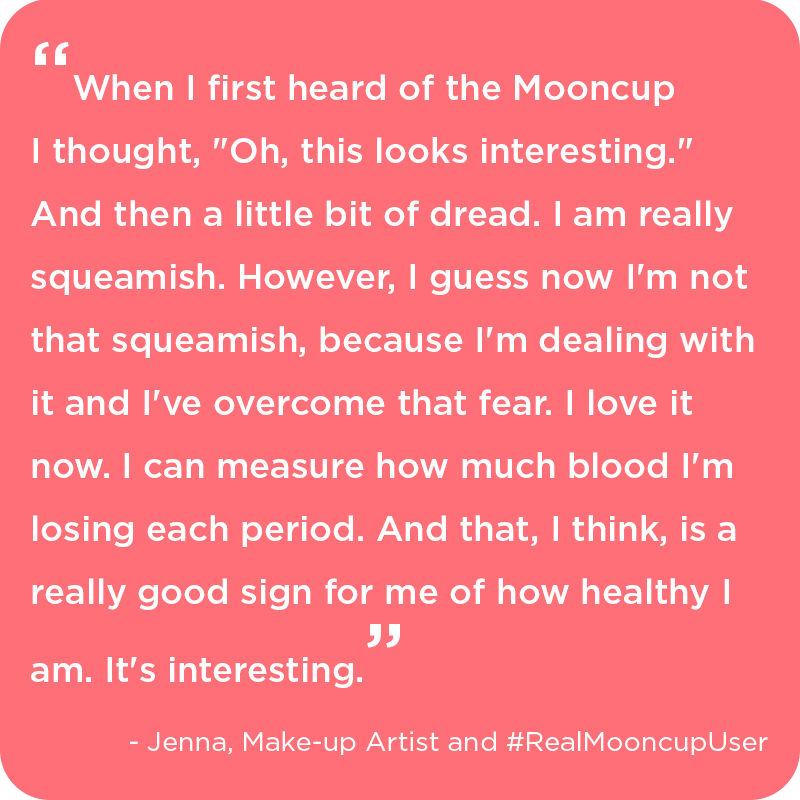Why are we afraid of blood?
It’s that time of year again, where blood and gore saturate our screens, coat our costumes and haunt our thoughts. But while some can’t wait to celebrate, others would really rather not…
How come some of us get a thrill from horror films, yet others feel faint at the sight of their own period blood? Is our blood squeamishness biological or learnt? And how does all of this affect our relationship with our menstrual blood?
It is not uncommon for us to squirm at the sight of blood, but for some people, the thought of it alone can make them feel nauseous, or even faint.
This can be caused by blood phobia, also known as hemophobia. It is a fairly common phobia, and often linked to others, such as the fear of needles or doctors.
Because bleeding is usually associated with something being wrong with the body, for some, the sight of their own blood can be enough to trigger health anxiety. Blood phobia can also sometimes be linked to a fear of death or germs.
Like many other phobias, hemophobia can cause physical and emotional symptoms, such as trouble breathing; hot or cold flushes; anxiety or panic or feeling a loss of control to name but a few.
Why does the thought or sight of blood make you feel woozy and faint?
Unlike most other phobias, hemophobia, like needle phobia, can also cause a ‘vasovagal response’, which means it triggers a sudden and significant drop in your heart rate and blood pressure.
But despite fainting being often seen as dramatic, or disastrous, it is in fact a natural self-protective response. If your heart rate and blood pressure suddenly drop considerably, then the part of your body most likely to stop getting enough oxygen-rich blood is your brain, causing you to feel-lightheaded, or even faint.
Some believe this drop in heart rate and blood pressure leading to passing-out at the sight of blood may be an evolutionary fear reflex. It’s thought to be a survival mechanism causing you to “play dead” in the presence of a predator, or if someone near you has been injured.
So, if you faint at the sight of blood, it is just nature doing its thing, and doing it pretty damn well!
How to manage your fear of blood?
If you suffer from hemophobia, your fear of blood can be debilitating to say the least. You may find yourself avoiding activities that carry a risk of injury, skipping medical appointments or even refusing surgery.
Treatments such as cognitive-behavioural therapy can help develop coping mechanisms to overcome your fear of blood. Other forms of therapy and even some alternative treatments may also help.
Why do we love gory horror films?

But if blood can cause such unpleasant biological uproar, then why on earth do some of us get such a kick out of seeing blood and gore on screen?
The truth is, we all experience fear – our biology dictates that we will all have a physiological reaction to naturally terrifying situations. However, whereas some hate the feeling, research has proven that others thrive off the thrill, and enjoy the feeling of victory and triumph that comes with sitting through the whole film and “overcoming” the fear.
We all have that friend that will hide under the blanket at the approach of a gory scene, and another who can’t get enough of it.
Again, biology may well have a part to play. Research carried out by the University of Bonn shows that fear and anxiety might have a partly genetic cause. Our sensitivity to unpleasant or gory scenes may well be influenced by which variations of the ‘COMT’ gene we have – the gene that controls our dopamine signals.
Real, life-threatening fear is a different matter. Psychology professor, Steve Joordens, from the University of Toronto explains that it’s a controlled type of fear that some relish – the kind that you can enjoy from the comfort of your sofa, one where you have all the natural responses to fear, but where you know you are, in fact, safe.
Why is menstrual bleeding loaded with cultural stigma?
Indeed, popular culture often preys on our natural fear of blood. This doesn’t usually involve menstrual blood, but there are exceptions – who could forget the scenes from the horror classic Carrie, where shy and sheltered teenage girl Carrie gets her first period in the gym shower and ends up bullied both at school and at home?

For those whose relationship with their menstrual bleeding is somewhat tainted, whether for cultural or biological reasons, their monthly period can bring up a whole host of complex emotions.
Indeed, menstrual bleeding can sometimes be a source of fear or shame, and it’s no surprise, when powers such as biology, patriarchal culture, and history are at play!
Aside from the biological fear, the deep-rooted cultural stigma surrounding menstrual bleeding has led many to still shy away in shame at the discovery of blood in their pants.
Ancient beliefs told that menstruating women were responsible for all manners of calamities, from spoiling crops, to causing rivers to run dry, and spoiling food. Some cultures and religions place prohibitions on women while they are menstruating, with some forcing women into segregation so as not to contaminate the surrounding food and water. In some regions of Nepal for instance, women on their period are thought to bring bad luck or ill-health, and some communities still banish them from the village during their period, a practise that was made illegal in 2005.
Whether we are period proud or not can be greatly influenced by the way we have been raised to perceive periods, not only from a religious and cultural point of view. Our family’s attitude towards menstruation, that may have been passed down through generations, as well as our experience of our first period, can all play their part.
Period blood is natural, period blood is normal

Did you know that the blood shed during our period, alongside that of childbirth, is the only blood we lose that is not caused by trauma? Our period is in fact a sign of a functioning reproductive system, and therefore a sign of good health.
Some people who have an aversion to blood or a phobia, say that their period blood doesn’t always affect them in the same way as blood from other parts of their body would. This can be due to the difference in appearance or smell. But also, if we think about the connection between blood phobia and phobias such as the fear of germs, pain, or death, then the understanding of what period blood is and where it comes from can help to reduce their discomfort. Knowledge as ever can be power!
In the medical world, menstrual blood is actually highly valued for its rich source of stem cells – special cells that have the ability to develop into many different types of cell in the human body, and can sometimes even fix damaged tissues.
The Mooncup menstrual cup can change your relationship with your period in many ways, one of them being that you are much more aware of the amount of blood you are losing. Unlike absorbent, disposable period products, such as pads and tampons, thanks to its transparent nature and volume measures, the Mooncup offers you a clear view of your blood and how much of it you are losing.
Tracking your flow is not only a way of helping you to own your period, it is also beneficial for staying in tune with your health. Changes to colour and consistency of blood can sometimes be a sign of an underlying health problem and if you have concerns should speak to a doctor.
We often fear what we don’t understand. While we can’t promise Paranormal Activity, the word on the street is that the little silicone cup helps you to get to know your body– with some even finding the way it helps them manage their blood ‘lifechanging’. Why not give it a go?… It’s really not that scary ?
Read more on the Mooncup® blog:
Love letter to my period
Jo’s story of ovarian cancer and how early diagnosis saved her life
How to manage heavy periods
How to reduce period pain and cramps






